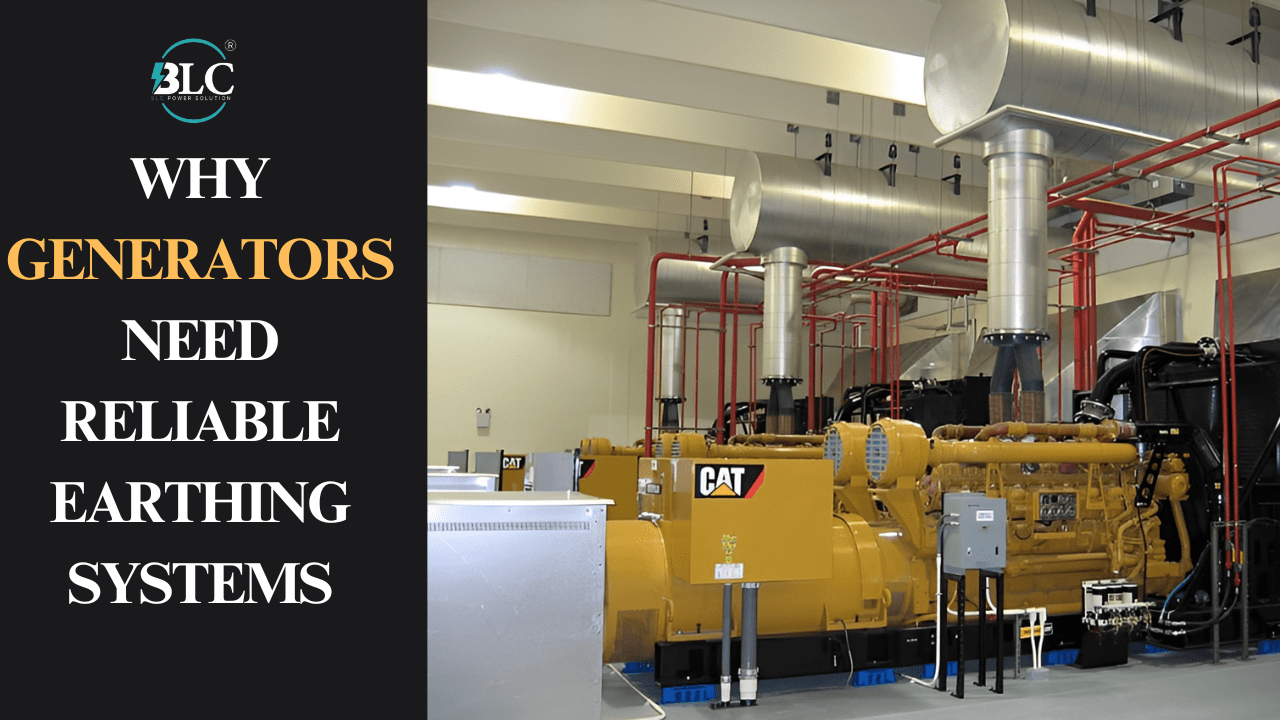Generators play an important role in providing reserve energy during disruptions and supporting a variety of industrial, commercial, and residential uses, while fuel and maintenance alone are not enough to protect them. Along with this, there is a great need for a good Earthing system in the generator, because Earthing systems also play an important role in the generator’s safety.
Importance of Earthing System in Generator Operations
Protection Against Electrical Faults: The greatest danger in generators is electrical shock and grounded electrical continuity ensures safety in power generation and use. It maintains electrical systems and reduces the risk of electric shocks and other technical problems. Also, earthing protects people and equipment from electrical problems by transferring high voltages and electricity produced by electrical systems to the ground.
Stability of Electrical Systems: Proper Earthing is very important for a generator as it helps its safety and performance for many reasons. The main role of the earthing system is to protect people and equipment from electrical faults. Additionally, the earthing system discharges excess current or excess voltage into the ground, thus maintaining the stability of the electrical system. Due to this, the correct operation of the generator is maintained and the electricity generated by it is properly distributed in the entire system.
Reducing Downtime:
The use of a good earthing system in a generator contributes significantly to reducing downtime. The earthing system protects the generator from electrical faults, ensuring its smooth functioning. A good earthing system helps in smoothing out electrical faults. This increases the electrical performance of the generator and improves the safety of its users. Additionally, this earthing system also provides the option to replace the ground for the generator in electrical opposite or special conditions.
Mitigation of Overvoltage:
The extra voltage flows to the ground when the generator is connected to it. During the process, the grounding system protects a particular battery or other delicate parts from the influence of power, avoiding damage to them.
Benefits of Investing in Reliable Earthing Systems
Preventive Maintenance:
Earthing system helps in safe and efficient generator operation. This system protects the generator components from electrical faults, thereby increasing their useful life. The use of Earthing systems reduces the need for high maintenance of generator components, which also reduces repair and maintenance costs. This not only extends the useful life of the equipment but also ensures electrical safety thereby helping to keep users and properties safe.
Operational Efficiency:
The earthing system improves the electrical stability of the generator and improves its electrical performance. This ensures that the generator’s high voltage or electrical reverse conducts to the ground, saving its internal structure from danger. The grounding system not only improves the stability and reliability of the generator but also increases its operational efficiency. This helps preserve the electrical composition of the device, making it more capable of long-term use and providing stability in applications.
Key Considerations for Generator Earthing Systems
Selection of Earthing Method
- Types of Earthing Systems: Analyze multiple types, such as grid, rod, and plate earthing, and choose which is best for generator applications based on local factors.
- Integration with Grounding Grids: Ensure generators are integrated into existing grounding grids or install dedicated earthing systems to optimize performance.
Maintenance and Monitoring
- Regular Inspections: Regular inspection of the condition of ground electrodes, connections, and grounding conductors is important for the electrical safety and performance of the generator and its equipment.
- Testing Earth Resistance: Conduct regular earth resistance tests to verify the effectiveness of the earthing system and promptly address any issues.
Compliance with Standards and Regulations
- Adherence to Safety Standards: Follow relevant safety standards and regulations (e.g., IEEE, IEC) to ensure compliance and mitigate legal and operational risks.
- Documentation and Reporting: Maintain comprehensive records of earthing system installations, tests, and maintenance activities for audit and regulatory purposes.
Conclusion
Finally, reliable earthing systems are important for the safe and efficient operation of generators. By implementing and maintaining proper grounding procedures, businesses can protect healthcare workers, protect equipment, and ensure continued operations during power outages. Installing durable grounding solutions may improve the security and functionality of generator installations while reducing risks.




